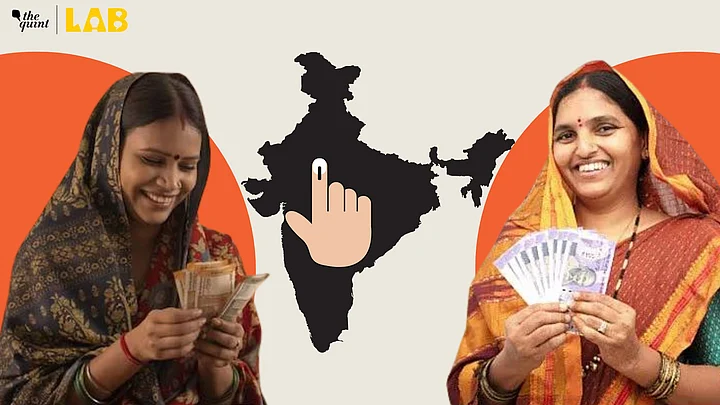Assembly election results of Maharashtra and Jharkhand see the incumbents retaining the power in their respective states. The credit to their victories is being given to the direct cash transfer schemes launched by their governments, just a few months before the elections.
This draws attention to the previous instances of such cash transfers to women by state governments. Our analysis shows that four out of four times in the past, such cash transfers have helped the parties to thwart anti-incumbency in the state Assembly polls.
We found that when the state governments actually handed out cash transfers to women before the Assembly elections, they not only successfully managed to dodge anti-incumbency but improved their tally from the previous elections. This applies only when the cash handouts were actually made and not when pre-poll promises of cash assistance were made.
Let's dive deeper into how cash transfers to women averted anti-incumbencies:
2021 West Bengal: Lakshmir Bhandar Scheme Shielded Mamata From BJP's Aggressive Campaign and Gave a Bigger Majority
Mamata Banerjee-led Trinamool Congress launched Lakshmir Bhandar scheme in February 2021, three months before the West Bengal Assembly election in May 2021. The scheme gave out monthly cash assistance of Rs 1200 to SC/ST women between the ages 25 to 60 years and cash assistance of Rs 1000 to the same age group of women from other categories. The women benefitting from the scheme must have been enrolled under the ‘Swasthyasathi’ scheme. Reports say that 2.11 crore women were beneficiaries of these scheme.
In the highly-charged elections, not only did the TMC manage to stop the BJP from forming its first government in West Bengal, it also gained more vote share despite 10 years of anti-incumbency.
2023 Madhya Pradesh: Ladli Behna Gave 54 More Seats to BJP, Vanishing Anti-incumbency of Close to Four Terms
Madhya Pradesh Chief Minister Shivraj Singh Chouhan launched Ladli Behna Yojana in August 2023, eight months before the November 2023 state Assembly elections. Under the scheme, women between 21-60 years of age, whose family income is capped at ₹2.5 lakhs, received financial assistance of ₹1000. As a result of which, BJP overcame an almost four-term long anti-incumbency. It also increased BJP's vote share by 7.53 % in comparison to the previous Assembly polls of 2018.
Congress' Madhya Pradesh unit also promised a direct cash transfer to women but couldn't avail a favourable electoral outcome because the BJP government had been actually transferring the money to over one crore women for eight months in the run up to the elections.
2024 Maharashtra: Ladki Bahin Turned an Expected Close Fight to a Historic Win for Mahayuti
The 2024 Assembly elections in Maharashtra were expected to be a close fight as the two of the top Maharashtra parties suffered a bifurcation. However, the launch of Ladki Bahin scheme, just three months before the elections, made sure that the ruling Mahayuti alliance get a decisive mandate.
Ladki Bahin scheme gave financial assistance of ₹1000 to over one crore women, whose family income is capped at ₹2.5 lakhs. The scheme helped Mahayuti recover from its poor showing in the 2024 Lok Sabha polls.
2024 Jharkhand: JMM-Congress' Vote Share Shot Up By 8%
Similar to Maharashtra's Mahayuti, Jharkhand's JMM-Congress government also launched Mukhyamantri Maiya Samman Yojana in August 2024. The scheme gave Rs 1000 to women between ages 21 and 50 years, whose family income is less than ₹ 3 lakhs annually. The scheme had over 40 lakh women beneficiaries.
Besides saving the INDIA government from getting beaten by the BJP, the scheme gave Hemant Soren a bigger mandate than the 2019 Assembly polls. JMM-Congress alliance's vote share shot from 35.35% to 44.33%, a massive jump of 8%.
Governments of Tamil Nadu and Delhi have also handed out cash to women but those states have not underwent Assembly elections since the transfer.
(At The Quint, we question everything. Play an active role in shaping our journalism by becoming a member today.)
